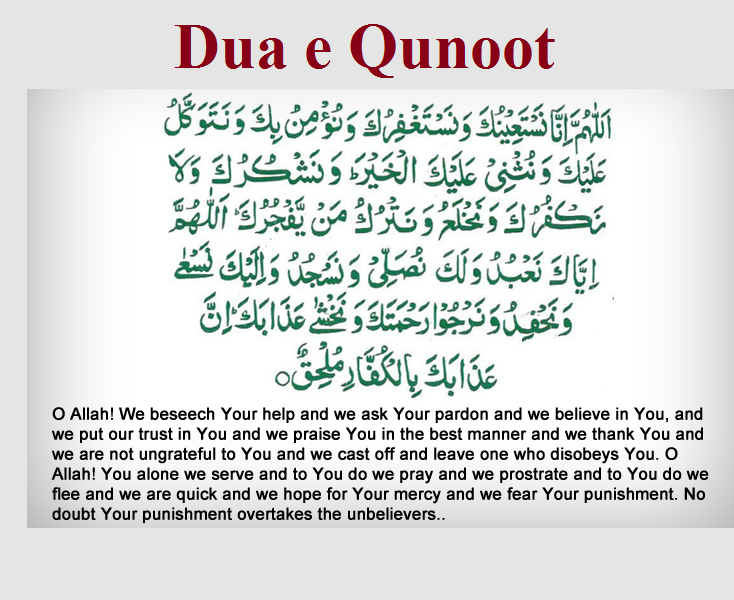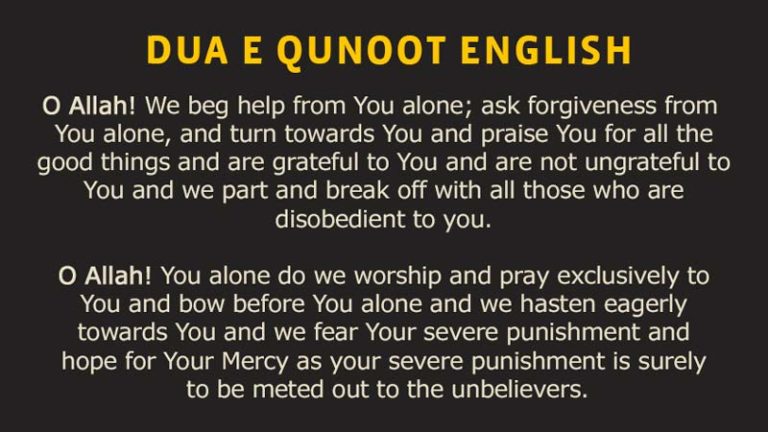


Undoubtedly, Your torment is going to overtake infidels, O’ Allah! Dua Qunoot in Englishĭua Al-Qunoot was narrated by Abu Dawood (1425), al-Tirmidhi (464), and al-Nasaa’i (1746) from al-Hasan ibn ‘Ali (may Allaah be pleased with him) according to him, The Messenger of Allaah (peace and blessings of Allaah be upon him) taught me some words to say in Qunoot al-witr.Īllaahumma ihdini feeman hadayta wa ‘aafini feeman ‘aafayta wa tawallani feeman tawallayta wa baarik li feema a’tayta, wa qini sharra ma qadayta, fa innaka taqdi wa la yuqda ‘alayk, wa innahu laa yadhillu man waalayta wa laa ya’izzu man ‘aadayta, tabaarakta Rabbana wa ta’aalayta la manja minka illa ilayk. O’ Allah! You alone do we worship, and for You do we pray and prostrate, and we betake to please You and present ourselves for the service in Your cause, and we hope for Your mercy and fear Your chastisement. O’ Allah! We implore You for help and beg forgiveness of You and believe in You and rely on You and praise You, and we are thankful to You and are not ungrateful to You, and we alienate and forsake those who disobey You. Shaykh al-Islam said in Majmoo’ al-Fataawa (23/100) Dua Qunoot in Arabic But they preferred reciting Qunoot after bowing and standing because Saheeh sunnah mentions it more often. And some say that supplicator should only recite it after bowing(rukoo).įuqaha’ among the scholars of hadith, such as Ahmad, say that both are allowed as Saheeh Sunnah mentions both. According to some narrators, one should recite Qunoot before bowing. There are two extreme views and one middle (or moderate) view about Dua Qunoot. However, reciting it after bowing is better. When to recite Dua e Qunoot?ĭua Qunoot is recited in the last Rakah of Witr prayer after bowing, but it is okay if one recites it before turning. Prophet Muhammad (PBUH) often recited it during Witr, Fajr, and sometimes during other prayers throughout the year.

Prophet Muhammad (SAW) recited Dua Qunoot whenever Muslims passed through a significant difficulty or disaster. In Dua e Qunoot we ask Allah for blessings, guidance, and strength. In Arabic, Qunoot means being obedient, or it is the act of standing. Here we will learn Dua Qunoot English and Dua Qunoot transliteration. Through Dua Qunoot, our Prophet Muhammad (PBUH) guided us to show modesty, obedience, and loyalty to Allah like many other dua.

There are many essential constitutes to meet your salah, and one of them is Dua e Qunoot. Dua Qunoot is one Dua that the Prophet Muhammad (PBUH) has taught us to show humility, obedience, and devotion to Allah. And there’s no better way to stay connected with Allah than prayers and supplications. One of the best rewards in this world is being close to Allah.


 0 kommentar(er)
0 kommentar(er)
